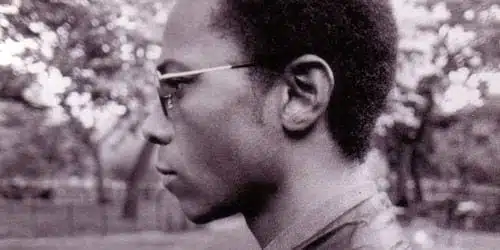
Brian Blade is the best drummer in the world, and I’ll stand on Neil Peart’s coffee table in my Blundstones and yelp it at him. It’s just how it is. The man is — and this is more significant than it sounds — extraordinarily musical in his approach to rhythm. A genius of texture, he has an uncanny ability to find complex tones and depths in the slightest tick across the hi-hat, the darkest boom of the floor tom. He, like any great master of a craft, can make the impossible suddenly possible. He can reveal the space beyond the visible. To watch him play is to witness the poetry of perfection.
I follow this man, as you can tell, with a kind of religious fervor. Ever since I first heard his work (on Emmylou Harris’s Wrecking Ball back in 1995), I was hooked. I sought him out, read liner notes voraciously, became a fan of numerous other artists just because they palled around with this budding master. It helped that he kept turning up on records by my favourite singer-songwriters. There was his excellent work on Victoria Williams’s gorgeous Musings of a Creekdipper, and his dense grooves on Bob Dylan’s Time Out of Mind. And then he began to tour with Joni Mitchell in the late 1990s (weirdly, but enjoyably, captured on the Painting with Words and Music DVD released in 1998). Still primarily a jazz drummer, he was all the while recording and playing alongside (Joni Mitchell vets) Herbie Hancock and Wayne Shorter, and building an important working relationship with Daniel Lanois.
All of this stuff clearly left an indelible impression on him — here, in 2009, the best drummer in the world has offered us a singer-songwriter record that bears the marks of all of those with whom he has worked, whose sounds he has studied, and whose aesthetics he has learned to reflect. For anyone familiar with Joni Mitchell’s post-Court and Spark material, it’s hard to miss the connection between this record and her sound. (He once told me, when I asked if he’d help me write an article about her work, “Anything for Joni!”) There is a strong Hejira vibe throughout these 13 tracks, and for those of us who revere that record and the luxurious, rain-soaked mood it creates, this is reason enough to pick up Mama Rosa.
Featuring musical contributions from a wide variety of Blade’s longtime collaborators and sidemen, including stunning lead guitar work from Daniel Lanois, typically outstanding steel guitar from Greg Leisz, and some terrific stuff by Fellowship Band members Jon Cowherd, Chris Thomas, and Kurt Rosenwinkel, this is like a musical family affair. Relative unknown NYC singer Kelly Jones offers a stirring counterpoint to Blade’s vocals on the standout tracks “Mercy Angel” and “Get There.”
On paper, the idea of a famed drummer making a record on which he’d both sing and play guitar appears to be a huge shift. But anyone familiar with the Brian Blade Fellowship will note the amazing similarities between this record and the (mostly) instrumental stuff Blade has put out before. In fact, if you took those old records and replaced the saxophone lines with Blade’s clear, soulful vocals, there’d be little to differentiate them from this new material. Especially on tracks like “You’ll Always Be My Baby” and “Struggling with That” (on which his Fellowship bandmates do their gorgeous thing) we can hear flashes of Blade’s instrumental work shining through. It all works.
What doesn’t work are the overbearing Christian clichés that weigh down the beauty of the songs. Blade is a deeply soulful man, the son of a much-respected preacher back in Shreveport, Louisiana, and he takes great pride in the role of faith in his life. But, like Dylan back in his Saved period, he is too fond of the clarity of religious mantras and not willing enough to push through them, past them, into the confusing complexities of the faith that they represent. It all amounts to a bunch of cheerleading for the idea of Christian faith as the solution to all earthly problems. The songs he is singing might be beautiful, and the messages he’s sending might be worthy, but the lyrics they’re delivered through tend to be uncomfortably obvious and bland. A shame, but not reason enough to dismiss this soulful, impressive release.
